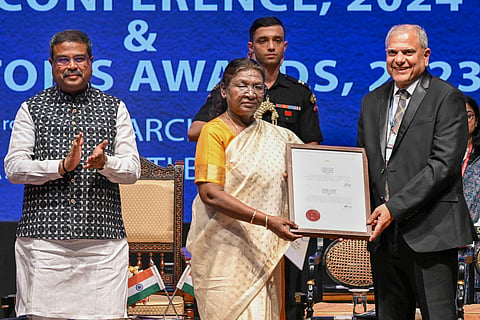

NEW DELHI: President Droupadi Murmu on Monday told the heads of higher education institutions that they have a crucial role in achieving the goal of establishing India as an important centre of the knowledge economy.
Inaugurating the two-day Visitor’s Conference 2024-25 at Rashtrapati Bhavan, the president emphasised that the development of any country is reflected in the quality of its education system.
Addressing the heads of India's premier institutes, the President said that along with excellence, social inclusion and sensitivity should also be an essential aspect of India's education system.
“No economic, social, or psychological limitation of any kind should be a hindrance in getting higher education,” she said, adding that the heads and teachers of institutions of higher learning should take care of young students, remove any insecurity from their minds and provide them moral and spiritual strength.
She urged them to make every possible effort to provide counselling and inspiration to students and spread positive energy in the campuses.
She also expressed confidence that with their global thinking, the heads of higher learning institutions would prepare a generation of builders of a developed India.
Highlighting the need to pay a lot of attention to research along with education, she said that the Indian government has established the National Research Fund with a very good objective and expressed confidence that institutions of higher learning would make good use of this important initiative and encourage research.
The President said that “the ambition of our higher education community should be that researchers from our institutions get recognition at the world level, patents of our institutions can bring change in the world, and students from developed countries choose India as a preferred destination for higher education.”
Noting that Indian students enrich the world's leading educational institutions and developed economies with their talent, she, however, emphasised the need to make efforts to utilize their talent in the country.
She said that the national goal of establishing India as a global knowledge super power would be achieved only when the world community is eager to adopt the work being done in our laboratories.
Highlighting that India has a rich tradition of scientific achievements, she said, the branches and sub-branches of Indian knowledge and science have flourished in every region of the country. “It would be very useful to rediscover the invaluable but extinct streams of knowledge and science by doing intense research,” she said, adding that it is the responsibility of the higher education ecosystem to find ways to use such organically grown knowledge systems in today's context.
At the occasion, Union Education Minister Dharmendra Pradhan highlighted that National Education Policy (NEP) 2020 stands at the heart of the two-day discussions, a transformative blueprint reshaping the country’s education system.
He also urged everyone to create an ecosystem that empowers the youth, strengthens the workforce, and accelerates India’s journey toward Viksit Bharat 2047.
“The nation ought to be self-reliant, innovative, and knowledge-driven. Education must go beyond degrees; it must create thinkers, innovators, solution-givers, and job creators, for which the implementation of NEP 2020 in letter and spirit is essential,” he noted.
He emphasized the importance of rising above institutional silos to ensure that NEP 2020 translates into real and long-lasting impact.
He stressed the importance of working collaboratively and sharing best practices to optimize academic strength, strengthen policies, and execute them well with a real impact on the ground.
At the occasion, the President also presented the eighth Visitor’s Awards in the categories of innovation, research, and technology development.
The Visitor’s Award for Innovation was given to Prof Saripella Srikrishna, Banaras Hindu University, for developing Novel Indigenous Innovation in Quantum Technology to boost the National Green Hydrogen Mission.
The Visitor’s Award for Research in the field of Physical Sciences was conferred upon Prof Ashwini Kumar Nangia, University of Hyderabad, for his seminal research in the discovery and development of high bioavailability drugs and pharmaceuticals with enhanced efficacy at affordable cost.
The Visitor’s Award for Research in Biological Sciences was jointly presented to Prof Rina Chakrabarti, University of Delhi and Prof Raj Kumar, Central University of Punjab. Prof Chakrabarti has been conferred the Award for her research contributions to Sustainable Freshwater Aquaculture while Prof Raj Kumar has been presented the award for his research contributions to exploring various cancer hallmarks and the development of synthetic anticancer lead molecules.
The Visitor’s Award for Technology Development was presented to Dr Venkateswarlu Chintala, Gati Shakti Vishwavidyalaya, for his research contributions to the petrol and diesel production at commercial scale from landfill municipal mixed plastic waste.